Photo by Ron Galella, Ltd./Ron Galella Collection via Getty Images
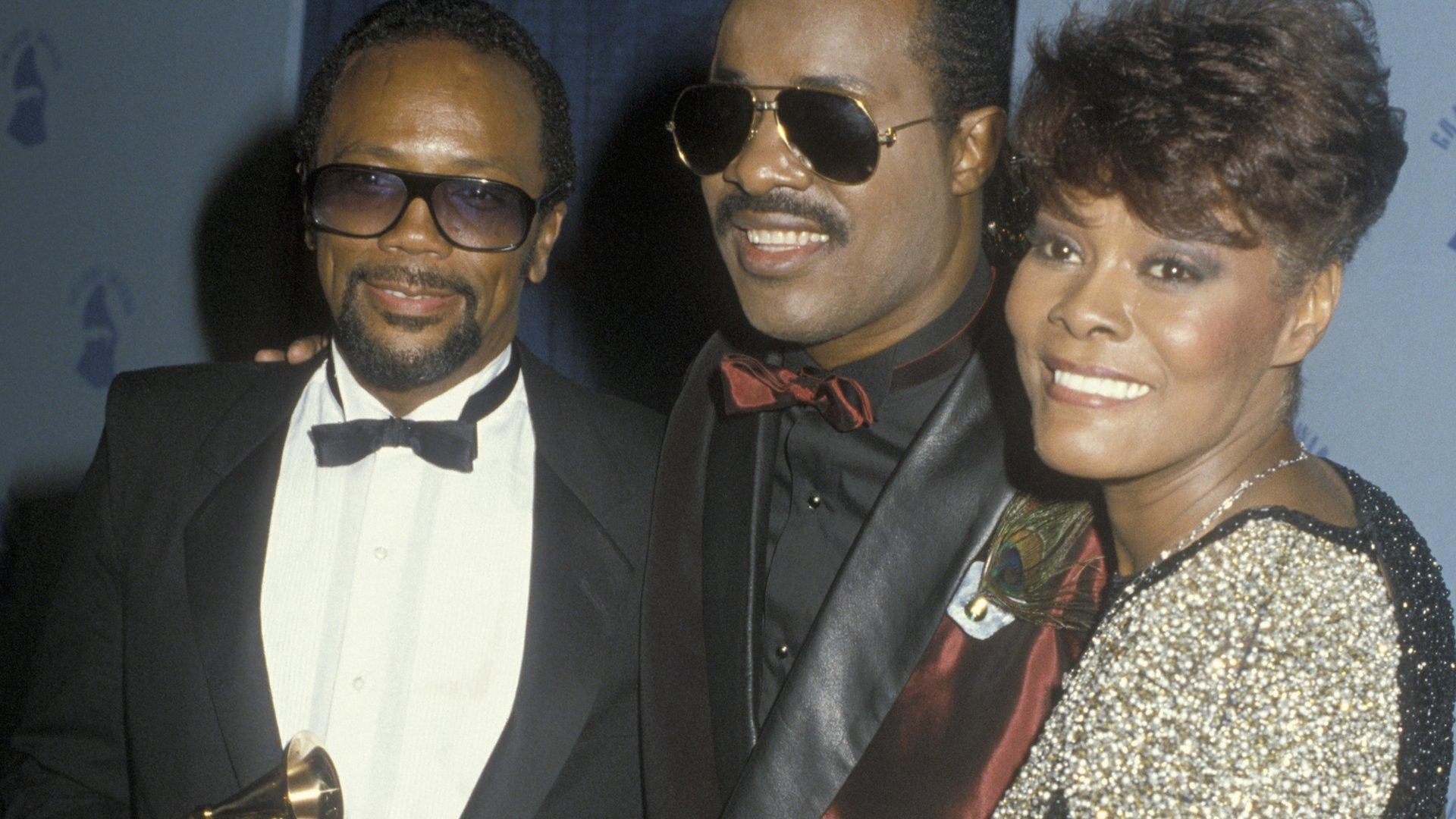
video
GRAMMY Rewind: Watch Quincy Jones Win Record Of The Year For "We Are The World" In 1986
In the newest episode of GRAMMY Rewind, 28-time GRAMMY-winning producer Quincy Jones wins Record Of The Year for his star-studded charity single "We Are The World"
"The children that changed this generation from 'I, me, mine' to 'we, you and us': I thank you on behalf of all of USA For Africa," Quincy Jones said to end his acceptance speech for Record Of The Year at the 28th GRAMMY Awards.
The latest episode of GRAMMY Rewind travels back in time to 1986 to relive one of Jones' three wins for his record-breaking charity single, "We Are The World." Watch the super producer's gracious acceptance speech below.
With contributions from megastars like Michael Jackson, Lionel Richie and Stevie Wonder — all three of whom joined Jones on stage in the above video — "We Are The World" helped raise more than $60 million for famine relief efforts in Africa. The star-studded single has sold over 20 million copies and was reportedly the first single to be certified multi-platinum by the RIAA.
Read: GRAMMY Rewind: Watch Lionel Richie & Michael Jackson Win Song Of The Year For "We Are The World"
Along with Record Of The Year, the single took home three other awards that night: Song Of The Year, Best Pop Performance By A Duo Or Group With Vocal and Best Music Video, Short Form. (Jones was not awarded Song Of The Year, as he was not a co-writer.) It was featured on an album of the same name, which was nominated for Album of the Year.
Jones has won 28 GRAMMYs in his lifetime, tying Beyoncé for the most-awarded living person. The 88-year-old legend is also one of the most nominated acts, with 80 nominations to date.
Check back every Friday for new episodes of GRAMMY Rewind.
Mogul Moment: How Quincy Jones Became An Architect Of Black Music

Photo: Sam Emerson
feature
Remembering Quincy Jones: Musical Pioneer, Inspiration, Activist & Renaissance Man
The conductor, composer, producer, arranger, musician, activist, and all-around mastermind passed away on Nov. 3 at age 91. An icon, Jones worked with most of music’s legendary names and inspired countless others, creating an unmatched legacy.
Quincy Jones helped shape nearly every facet of pop music history, either directly or indirectly, for more than half a century. On Nov. 3, the consummate multi-hyphenate passed away at the age of 91.
The recipient of 28 GRAMMY wins and 80 nominations — ranking third and fourth most in the organization’s history, respectively — Jones will be remembered for his work with everyone from Michael Jackson to Frank Sinatra, Aretha Franklin to Count Basie. He was also known for his powerful support of many humanitarian causes.
Jones’ legacy within the Recording Academy dates back to just a few years after its founding. The Great Wide World of Quincy Jones was nominated for Best Jazz Performance Large Group at the 3rd GRAMMY Awards, and not a decade passed since without the icon receiving an award. In addition, Jones was the recipient of the Trustees Award in 1989, the GRAMMY Legend Award in 1992, and the MusiCares Person Of The Year in 1996, and was the subject of a GRAMMY Foundation gala tribute in 2014. In 2023, Jones became the first-ever recipient of the Academy & State Department’s PEACE Through Music Award.
In presenting that last award, Recording Academy CEO Harvey Mason jr. called Jones his "friend and mentor," and noted that his respect and admiration for Jones are echoed throughout the organization. "We are all absolutely heartbroken by the passing of the incomparable Quincy Jones," Mason jr. said in a statement. "A master of many crafts, Quincy’s artistry and humanity impacted artists, music creators, and audiences around the world and will continue to do so. He has been recognized by his Recording Academy peers with an extraordinary 28 GRAMMY awards, standing among the most celebrated recipients in GRAMMY history. Quincy leaves behind an unmatched legacy and will always be remembered for the joy he and his music brought to the world."
Jones' long list of accolades also includes honorary degrees from Harvard, Princeton, and Juilliard, as well as a National Medal of Arts. His legacy doesn’t stop with the immense impact of his music, but extends to activism and humanitarianism. Jones was an advocate for Dr. Martin Luther King Jr. and his Operation Breadbasket, served on the board of People United to Save Humanity, founded the Quincy Jones Listen Up Foundation, supported the work of the NAACP, GLAAD, and other organizations, and produced the "We Are the World" charity single.
With such a massive footprint both personally and professionally, it should be no surprise that news of his passing has resulted in seemingly endless remembrance and thanks across social media. Elton John, Victoria Monét, Reverend Al Sharpton, LL Cool J and Lin Manuel-Miranda were among the many artists praising Quincy Jones' influence and legacy.
"Wow, Q - what a great ride!!" Lionel Richie wrote on X, accompanied by a picture of the two together. Jones and Richie worked closely together on "We Are the World," a project which was also co-written by Michael Jackson. After connecting with Jackson for The Wiz, Jones became a frequent collaborator of the pop icon, including the albums Off the Wall, Thriller, and Bad.
"The world mourns the loss & celebrates the life of Quincy Jones," the Jackson estate shared. "A legendary talent whose contributions to music spanned generations and genres. What an MJ/Q decade-long partnership produced is unmatched and includes the biggest selling album of all time. Rest in Peace, Q."
Clive Davis similarly mourned Jones’ passing. "Quincy Jones was a true giant of music," he wrote on Instagram. "Whether it was jazz, pop, r&b or rock, no genre of music escaped his genius…Say ‘We Are the World’ and say ‘The Color Purple’ and you’ll understand the range of his music. He was the ultimate music renaissance man and a true inspiration to all of us in music."
In an Instagram post, John Legend reflected on joy Jones "brought to every room. He was the life of the party, so charming and full of light. I feel so fortunate to have witnessed it in person. But we’re all so fortunate to live in a world made more beautiful by the music he created."
A True Innovator Who Always Built Up
"I'm often asked what my 'formula for success' is...but to be honest, there is no formula or road map, and if anyone tells you there is, they're full of it," Jones wrote in the introduction to his 2022 book, 12 Notes: On Life and Creativity.
For Jones, that winding road started with a childhood on the South Side of Chicago, before moving in his early years between Kentucky and Washington before joining his school band and choir, not to mention convincing Count Basie trumpeter Clark Terry to give him lessons. He also crossed paths and shared the stage with Ray Charles, when Jones was 14 and Charles 16. An obviously prodigious talent, Jones relocated to New York by his early 20s; he quickly became a freelance arranger for Count Basie and musical director, arranger, and trumpeter for Dizzy Gilespie.
Jones began his solo recording career in 1956 with This Is How I Feel About Jazz, and moved to Paris, where he learned to arrange strings and studied music theory. This was followed by invitations to work on stage musicals and film soundtracks (including The Pawnbroker, In the Heat of the Night, and In Cold Blood (not to mention much later contributing music to and even appearing in the Austin Powers series. Jones had signed as an artist to Mercury Records in 1958 and moved his way up the executive ladder — a first for a Black man at a major label — becoming music director and, eventually, vice president.
After excelling in jazz at Mercury, Jones reached pop success by shepherding Lesley Gore's "It's My Party" to the top of the charts. He continued releasing his own material as well, experimenting at the intersections of jazz, funk, and more.
While Jones may be most known for his 1980s run with Michael Jackson, the decade also saw him open Qwest, a label that released works from the likes of Frank Sinatra, Lena Horne, and New Order, among many others. "It’s so sad to hear about Quincy Jones. When he signed us to his label, he made us feel so welcome - inviting us to dinner at his home every time we were in town," former New Order bassist Peter Hook posted on X. "He made us big in America. He was so humble & sweet that you immediately fell in love with him."
Read more: Mogul Moment: How Quincy Jones Became An Architect Of Black Music
Jones won 13 of his 28 GRAMMYs in the ‘80s, including Record Of The Year, Best Pop Duo or Group Performance, and Best Music Video for "We Are the World." In a recent interview with GRAMMY.com, Lionel Richie described Jones’ steady, nurturing hand on the project: "I asked Quincy a very important question one time. I said, ‘How in the world did you deal with all of those various personalities and stuff?’ He said, ‘What do you think an arranger does? … My job is to organize chaos.’"
A Jack Of All Trades — And Master Of All
In addition to writing and recording his own music and producing for others, Jones proved to be a mastermind across many other parts of the entertainment industry. In the '90s, he launched Quincy Jones Entertainment. Beyond operating his record label, the company produced successful TV shows like "The Fresh Prince of Bel Air" and "Mad TV", and helped publish music magazines Vibe and Spin.
The ‘90s also saw Jones’ music intertwined with hip-hop, most notably as sampled by Tupac in the chart-topping "How Do U Want It." The legendary Ice-T, who had guested on Jones’ album Back on the Block, expressed the impact that the legendary musician and producer had made: "Love you Quincy.. You changed my life."
One of Jones’ final appearances on record came in 2022, where he provided a spoken word track to The Weeknd's Dawn FM called "A Tale By Quincy." The Weeknd’s Abel Tesfaye even wrote the foreword to Jones’ 2022 book, 12 Notes, which included a powerful summary of the impact that Jones had on Tesfaye — and the entire musical world. "Even if you've already read his autobiography or know everything there is to know about him, I hope you'll take time to listen to the advice he has to share with you in the pages of this book," Tesfaye wrote. "Because I promise it is what matters the most."
"My fans know how important Quincy was to the fabric of my music," he added on X. "[I] tried to capture what he meant to me as a human. Let’s celebrate his life today."
Latest News & Exclusive Videos
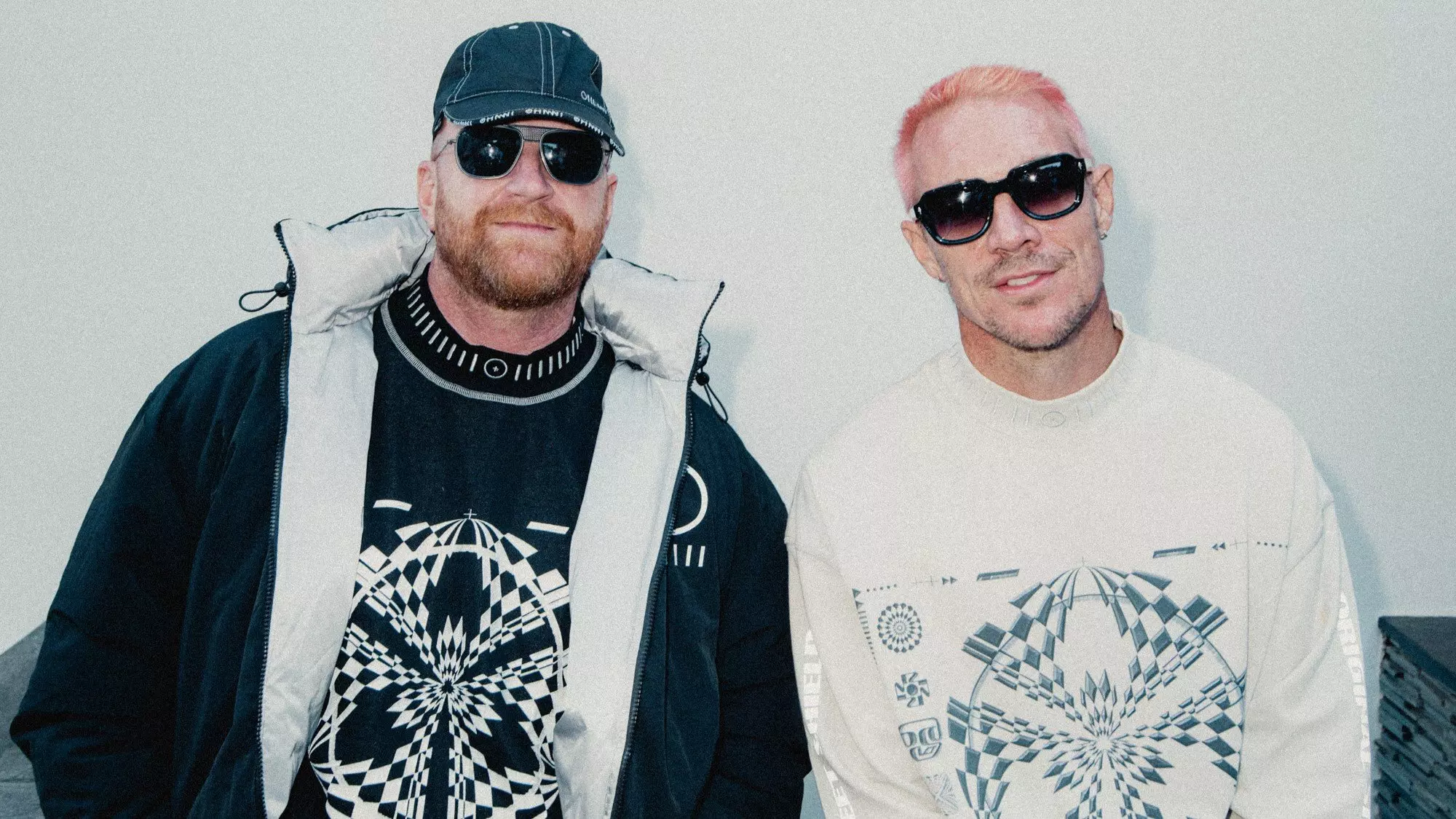
How Major Lazer's 'Guns Don't Kill People…Lazers Do' Brought Dancehall To The Global Dance Floor

YOASOBI Performs "Idol" | Global Spin
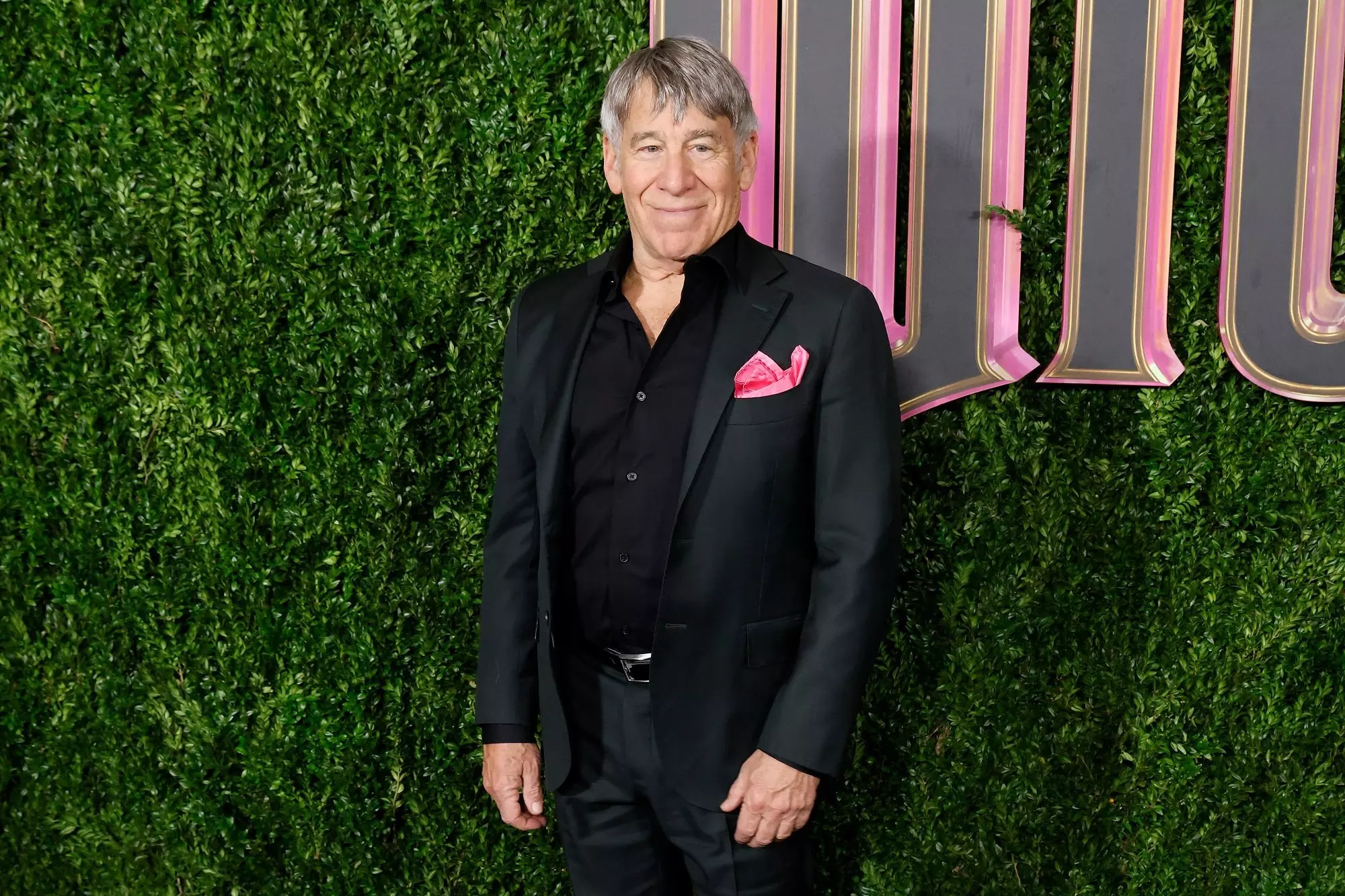
'Wicked' Composer Stephen Schwartz Details His Journey Down The Yellow Brick Road
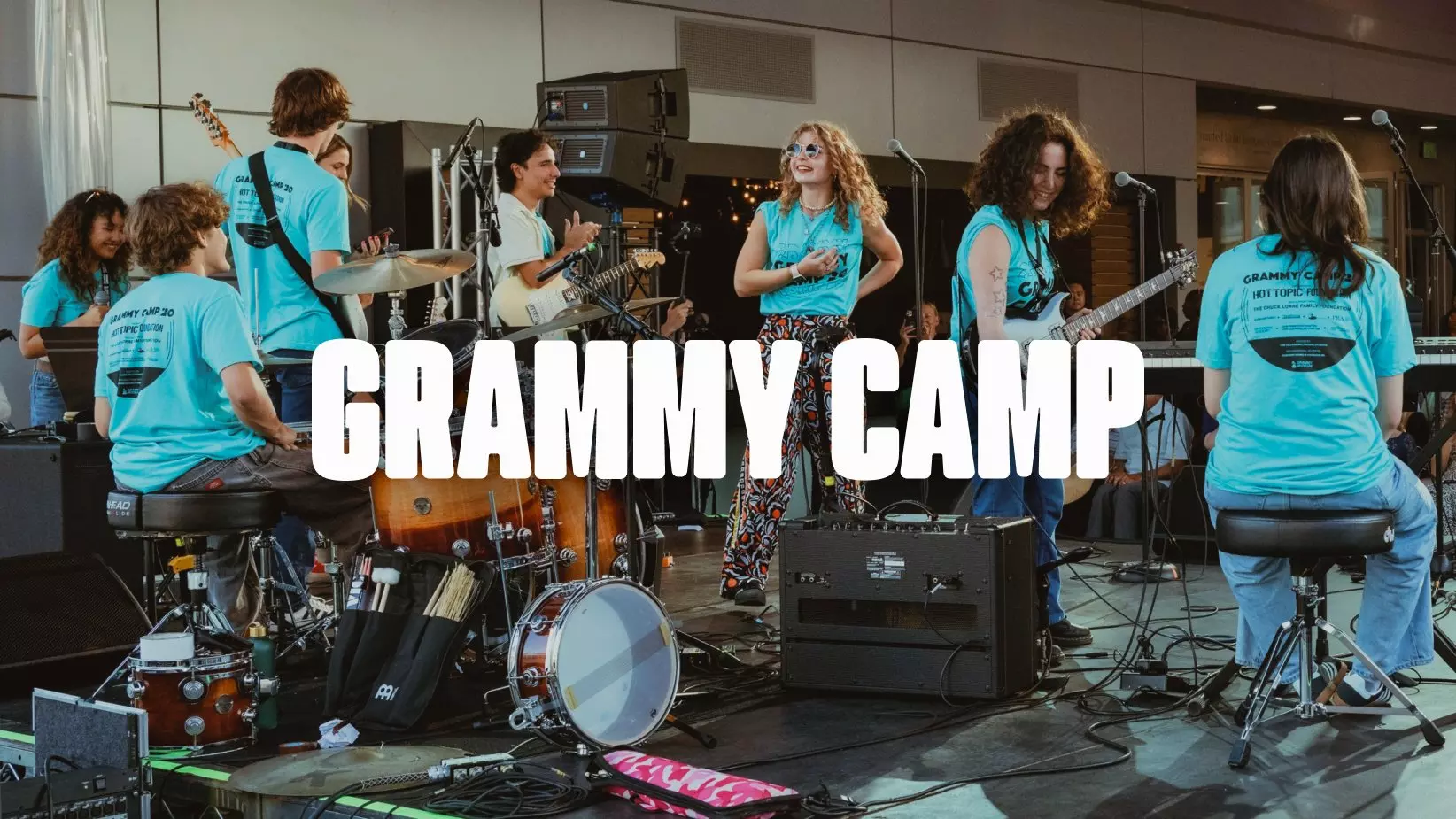
GRAMMY Museum Expands GRAMMY Camp To New York & Miami For Summer 2025
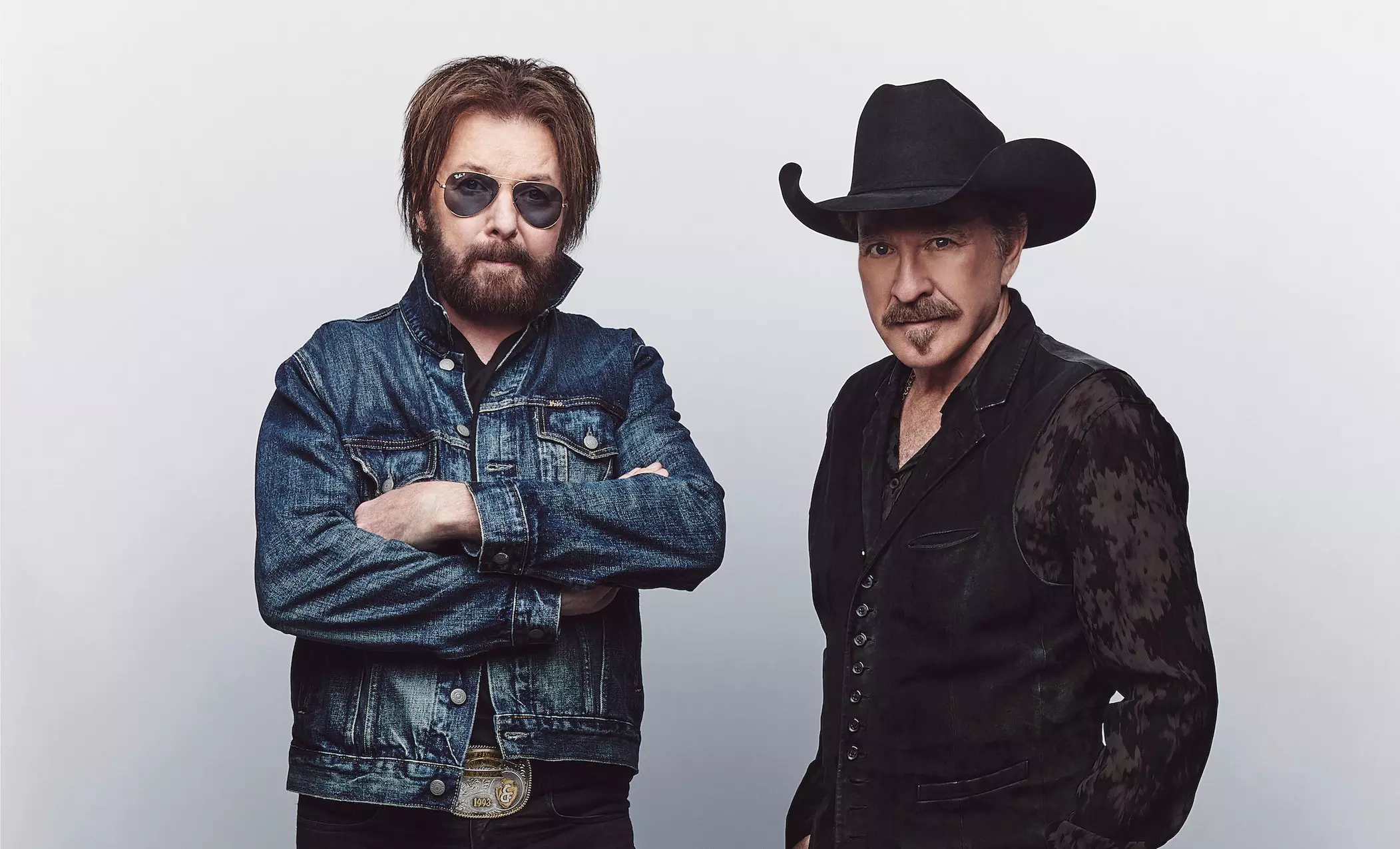
Living Legends: Brooks & Dunn On How 'Reboot II' Is A Continuation Of "Winging It From Day One"
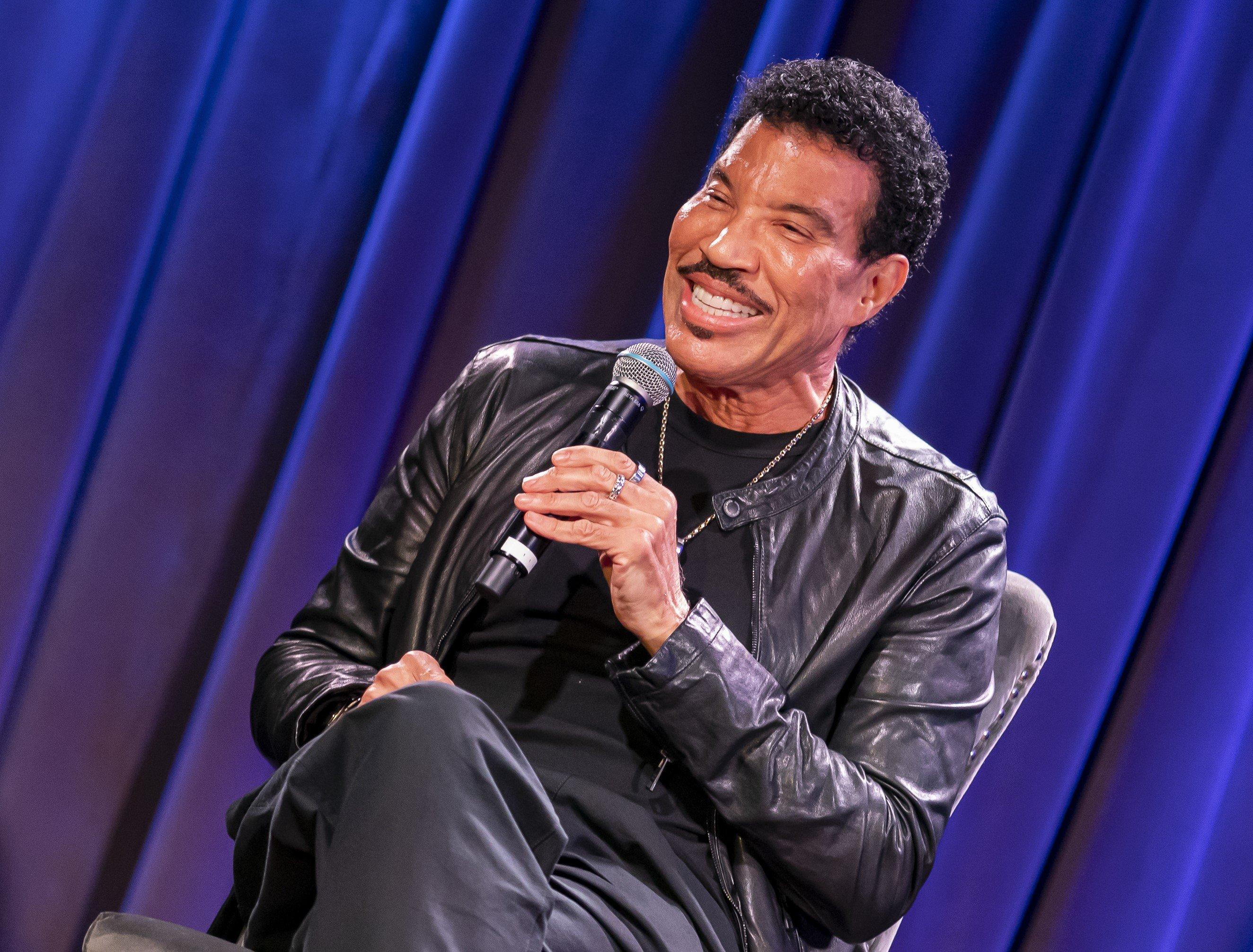
Photo: Corine Solberg/Getty Images
interview
Living Legends: Lionel Richie On 'The Greatest Night In Pop,' "American Idol" & The Evolving Essence Of The Music Industry
"When I wrote those lyrics…it was exactly the feeling of where we are now as a world," Lionel Richie says of "We Are the World." In a wide-ranging interview, the four-time GRAMMY winner discusses the iconic charity single and his career to date.
Whether explaining to his parents that the Commodores would be the "Black Beatles" or writing a mega-smash charity single in a single evening, a young Lionel Richie has something of a mantra: "Everything was possible."
When the now-iconic "We Are the World" first hit the airwaves in 1985, listeners surely were awed at the thought of so many legends in one room. Performing under the banner of USA for Africa, the track featured everyone from Ray Charles to Stevie Wonder, Michael Jackson to Bruce Springsteen, Cyndi Lauper to Tina Turner, and sold more than 20 million physical copies to raise money for African famine relief. The song’s recording was documented and encapsulated in the recently released documentary The Greatest Night in Pop.
Richie is the glowing supernova of musicianship creative wrangling at the core of the song and film. "Part of the whole magic of the song was to know the back side of it," Richie tells GRAMMY.com, hinting at the open, warm tone that has characterized his entire career.
Richie's sterling vocals and immaculate songwriting first rose to international prominence in his time as co-lead singer of Motown heroes the Commodores, for whom he wrote songs like "Easy" and "Three Times a Lady." Richie expanded his already endless pop charm as a solo artist, topping charts and winning countless acclaim and listeners’ hearts alike with songs such as "All Night Long (All Night)," "Hello," "Say You, Say Me," and "Dancing on the Ceiling."
When the concept for creating a track to raise funds and awareness for African famine relief was first broached by legendary artist and activist Harry Belafonte and manager Ken Kragen, Richie was tapped to write the song with Michael Jackson. The duo pulled an all-nighter to write the track a day before the first recording session — which also happened to be the very same day Richie was to host the American Music Awards, his first hosting gig on television. (Richie has become a fixture on TV, including his recent stint as a judge on "American Idol.")
Throughout his myriad roles and projects, Lionel Richie remains both incredibly professional and one of the warmest personalities in the music industry — not to mention a captivatingly brilliant musician and four-time GRAMMY winner. GRAMMY.com caught up with Richie to discuss the making of "We Are the World," finding himself in the room with every one of the icons he admired, and the continued need for hope and positivity 40 years later.
I have to tell you, I re-watched The Greatest Night in Pop this morning, and it is no less incredible after another watch.
Thank you. It's one of those moments in time. Just to see the positivity, number one, and number two, the impossibility of how we pull this off. Trying to do that today, you would just want to drive yourself crazy. There's no way today you can keep a secret.
Of course you’d have a leak, and is everybody going to show up? There’d be too many egos. "Leave your ego at the door?" You won't even leave your ego at the phone call.
The whole business has changed. But in the documentary, you really feel the weight of the challenge and the massive scope of opportunity. During that time, were you completely confident or or was there a constant worry that it might fall apart? Perhaps you had so many responsibilities that success and failure didn't even cross your mind.
You know what's so brilliant about being young and naïve? Everything has possibilities.
I look back on my career, when I walked in that door that fateful day that I was going to tell my parents that I was going to drop out of my last semester of my senior year and go full time with the Commodores. And I said, "Mom, Dad, we're the Black Beatles. We're going to take over the world." That takes a lot of just innocence and naivety and youth. Everything was possible. With "We Are the World," we were all kind of sitting there going, "What can we do [to make this work]?" And as we started calling up people, it just became "I'm in." "I'm in." "I'm in."
Of course, Ken [Kragen, manager] didn't tell us that he was making all these phone calls. We just thought it was going to be Quincy [Jones], Stevie [Wonder], Michael [Jackson], and myself. And Harry Belafonte. And the next thing we know, we've got all these artists waiting for the song that we haven't written. [Laughs.]
I think that was so wonderful that you didn't have that level of project in mind. Whilst naivety is part of the process, I feel like if you weren't able to be so in the moment, the song may have come out differently.
I always believe that if you have too much time to think about something, you're going to mess it up. I said yes to something that I didn't realize I had no time to do. This is my solo time in life. I've just left the Commodores; I'm hosting the American Music Awards. I've never done that before.
And of course, the pressure was there as well. Who is this kid to host this show alone? Alone, alone, not with two or three hosts. There was a lot of doubt as to whether this kid could do this or not, you know. As time went on, it just became another part of the story. And I've always believed I'm very good at getting myself into crap. And then I have to work my way out of it.
You're a good swimmer.
[Laughs.] Yeah. And so this thing just started evolving. "Okay, Lionel, what about the rehearsal for the American Music Awards?" And I go, "Oh, that's right. We have to rehearse."
The rehearsal time was also the time we had to cut the track for "We Are the World." And then we have to write the lyrics. Meanwhile, I have to rehearse [for the AMAs]. But, you know, I look back on it, honestly, and it was just divinely guided. Sometimes if you just have a chance to sit back and think about the intricate parts of it, everyone showed up at the right time to do the right thing.
It was astonishing to think about how many roles you had in that record coming to life. You were a writer, a singer, a producer, a coach, a psychiatrist, a guide. And you continue taking on so many different types of projects and roles to this day.
Well, let me tell you what makes things like "We Are the World" happen. I won’t just sit here and talk about, you know, how I did it. That was a room full of pros, you follow me? Quincy Jones, master producer, master arranger. I asked Quincy a very important question one time. I said, "How in the world did you deal with all of those various personalities and stuff?" He said, "What do you think an arranger does?" I said, "What do you mean?" He said, "What do you think I do for a living? My job is to organize chaos." In other words, the woodwinds are playing one thing. The brass are playing something else. The violins are playing something else. And all together it sounds like a song. Well, he was the master of that.
When you bring in artists from all different genres, each one of those artists, A, had their own sound, and B, knew how to deliver it. So all we had to do was kind of set the stage for them to do that half a line and pull it off. But behind the scenes, look at Humberto Gatica. He is a great engineer. How many tracks can you mess up? He had 99 million tracks and all of a sudden we couldn't have a delay [in the schedule]. There was no delay possible. I think what made my part of this whole thing, I was just putting out fires. Wherever there was a fire, like, "Okay, Bob Dylan, you need to go see Stevie Wonder. [Laughs.] And Huey Lewis, you just need to calm down." He thought he was just going to come and hang out.
Oh, Huey is such a fun guy!
Huey was going, "I'm going to sing whose part?" [Laughs.] It made everybody honest. I said, "Okay, Quincy, how are we going to pull this off? Is everybody going to go in the vocal booth one by one to do their parts?" He said, "No, no, no, no. We're going to put them in a circle and let them sing to each other." And I said, "What?"
He said, "I promise you, they'll be perfect on every round." Because when you're facing each other, there is no "Give me another take" or "Give me two more takes" or "Let me warm up." Just the fear factor of facing every artist you've ever admired in your whole life. There's Ray Charles over there. There's Kenny Rogers over here. There’s Diana Ross.
And Tina Turner!
And Bruce. And Billy Joel. We were, basically, the youngsters in the room. There's Michael. We'd all been around in the business a long time, but we'd never just been in a room to face each other.
So I think what was so amazing is when we went around one time at that piano, just to hear how it was all going to sound, that's when we knew we've got something. It was going to be a good sound.
Fitting all those different sounds and voices is such a beautiful achievement. It really makes you stand out, that ability to guide people and projects so naturally. It really makes sense that you have this continued role as a statesman of the industry, even down to your work on "American Idol."
You know what was so great? What we all heard back then, and what still rings true today, there's a word that the world needs right now. It's called hope. [When] that song came out 40 years ago; it was this amazing light, this beacon of hope. People started going, "Ah, okay, you're right. We need to care about each other."
It's one of those aha moments when you realize that a group of us got together and actually made that statement. As world-famous artists, we took all of our light as celebrities and entertainers and songwriters and shined it on hunger and starvation in the world. It was just a great statement.
I’m sure you have countless admirers who come up to you and talk about your work, but can you share some things that listeners have told you about that song in particular?
What I loved is when you start getting the 7- to 12-year-olds [saying] "We sing ‘We Are the World’ in our school!" Then that segues over to "American Idol."
When I first met Bao [Nguyen], the director [of The Greatest Night in Pop], he scared me to absolute death because I'm thinking that we're going to bring in a well-seasoned director from 1983 or 1984. He says, "I was two years old when that song came out in Vietnam." [Laughs.]
A lot of people just heard the song, but they didn't know the background [or my role in it]. So they didn't know that Michael and I wrote the song together. They knew I was maybe in the song, but they didn't know to what degree. I’m having a lot of people just come up to me with the sheer discovery. "Oh, my God, I didn't even know you did it."
"Where have you been?"
It really tells how blessed we were, because think about this now. All of us [working on the song] went on to have careers, major careers; that was the beginning of our big explosion.
What I love the most, I think, is just the fact that what Michael and I set out to do with that song was we wanted not a song, not a hit record. We wanted an anthem. We wanted a song that will stay around generation after generation, year after year. When people ask me right now, "God, Lionel, you need to write another song, because we need it so much today." And I go, "Play the song again."
It's so relevant. Absolutely.
Everything I wanted to say 40 years ago, I would write today. In other words, history just keeps repeating itself over and over again. And everyone keeps thinking you need something new. No, the whole song said everything.
But then when was your last all-nighter? Because that was a pretty epic all-nighter that you had that night.
[Laughs.] That was an "all-two-dayer"! That was the day before rehearsing for the American Music Awards. You then wake up and then actually start rehearsing from 7 in the morning at the Shrine Auditorium 'til the show started, and then to leave there at 11 o'clock at night, 12 o'clock at night. I forgot to also mention [that] I was not quite prepared for hosting, because this was my first time doing it. But also, I wasn't ready to win. [Editor's note: Richie won six times at the AMAs the year, including Favorite Pop/Rock Male Artist.]
It was a lot of moving parts. But the beautiful part about it was, I think the dedication and the hearts of each of those artists. Everybody came to shine their light on this issue. And the brilliance of it is, it worked.
What's something positive that you've been feeling about music lately?
Well, here's what's happening. I went into "American Idol" thinking, There is no possible next level of artistry. Because I've been there, done it, I've seen it. This is my eighth year coming up on "American Idol" and talent keeps showing up. Unique talent keeps showing up. Writers keep showing up. And I think what I'm looking forward to is when the industry can now keep up with the talent. Because we're overflowing with talent.
The problem now is, how do we get all of this talent recognized around the world? I mean, when I get to the top 20 on "American Idol" literally, I could start a record company on the top 20. We're throwing off such amazing talent. You constantly have to think, Okay, what are we doing?
For example, Jennifer Hudson did "American Idol," and she was let go at number nine, and then went on to become a massive star. This year coming up, Carrie Underwood won "American Idol" and here she is now coming back as a judge and mentor.
My situation now is, how do we get more of this talent recognized to the world? We were very fortunate back then because everything back then was global. There were only basically four different networks you could deal with. And then if you want to go outside of that, it's called BBC. What the internet did was great in terms of everybody's on it, but it also made it a big soup. You've got so many different angles and avenues. How do you focus your audience?
I think what's going to happen in the next couple of years is technology is going to be able to help us in a lot of ways. Because there has to be a new model that's going to be able to showcase not only the artists, but then there's the writers, the producers, the engineers, the musicians.
Yes! More focus on the collective who create the art. Where are the credits? I want my liner notes.
Exactly! I don't want to be the guy who’s like, "Bring back the good old days," but…
I think a lot of people are saying the same thing, no matter what age they are.
I couldn't wait to read the liner notes. Who's on that record? Oh my God, that writer was on there. Oh my God, that musician was on there. So-and-so sat in on the session. Part of the whole magic of the song was to know the back side of it, what was really happening. There's a lot that we can discover going forward, but there's a lot that we are losing from the past that I would like to bring up. Because we're not really giving credit where credit is due.
We need time. But we also need the advocate, the voice behind a message, which you are so clearly great at. You saw darkness in the world and put out a song. We know that song is not going to fix whatever the problem is, but the music becomes a comfort. What is that song for you that brings you to the place where you're feeling downright comfort?
I don't want to be the one to go that route, but my go-to for calm is "Easy Like Sunday Morning" ["Easy", from the Commodores’ 1977 self-titled album]. I know that it's always best when you use somebody else's song, but I wrote that song in a state of just that. I wasn't quite sure. I wasn't aware. The other song would be "Zoom" [from the same album]. The lyrics to that song basically sums up exactly where we all are. There's a place we'd all like to go and just hide for a moment to get away from all this craziness. I use those two songs as my mantras just because of the message that it gives.
That duality of "I'm telling you my story, but also we're all sharing this." I love it.
I think the entry of that was, "I may be just a foolish dreamer, but I don't care. All I know is my happiness is out there somewhere." We're all looking for that silver lining, that horizon that we've never seen before. When I wrote those lyrics, I must tell you, it was exactly the feeling of where we are now as a world. Because it was confusing. Think about it. This is the early ‘70s, coming out of the ‘60s, the craziness of Vietnam, and as a kid, what's out there for us? I don't know. What's the possibilities? We're not sure. And so here we are again, yet again faced with this survival of how do we stay sane in this world of insanity?
And how do we feed each other with things that feel nourishing?
What I love about the music business is that what determines a real hit record is when people walk up to you and go, "Lionel, I felt the same way." Now, that means you start realizing that, "Yes, I wrote a love song, but those words helped everybody else. That feeling that I felt is the feeling that everybody else felt."
So it's a confirmation that we're all human. We're all feeling. There are moments of happiness. There are moments of tragedy. And we're all doing this in the same world of trying to cope. And so I always say at the end of the day, there's got to be this common bond of humanity and mankind. There's got to be a thread of hope. Otherwise, we've lost the plot completely.
Latest News & Exclusive Videos

How Major Lazer's 'Guns Don't Kill People…Lazers Do' Brought Dancehall To The Global Dance Floor

YOASOBI Performs "Idol" | Global Spin

'Wicked' Composer Stephen Schwartz Details His Journey Down The Yellow Brick Road

GRAMMY Museum Expands GRAMMY Camp To New York & Miami For Summer 2025

Living Legends: Brooks & Dunn On How 'Reboot II' Is A Continuation Of "Winging It From Day One"
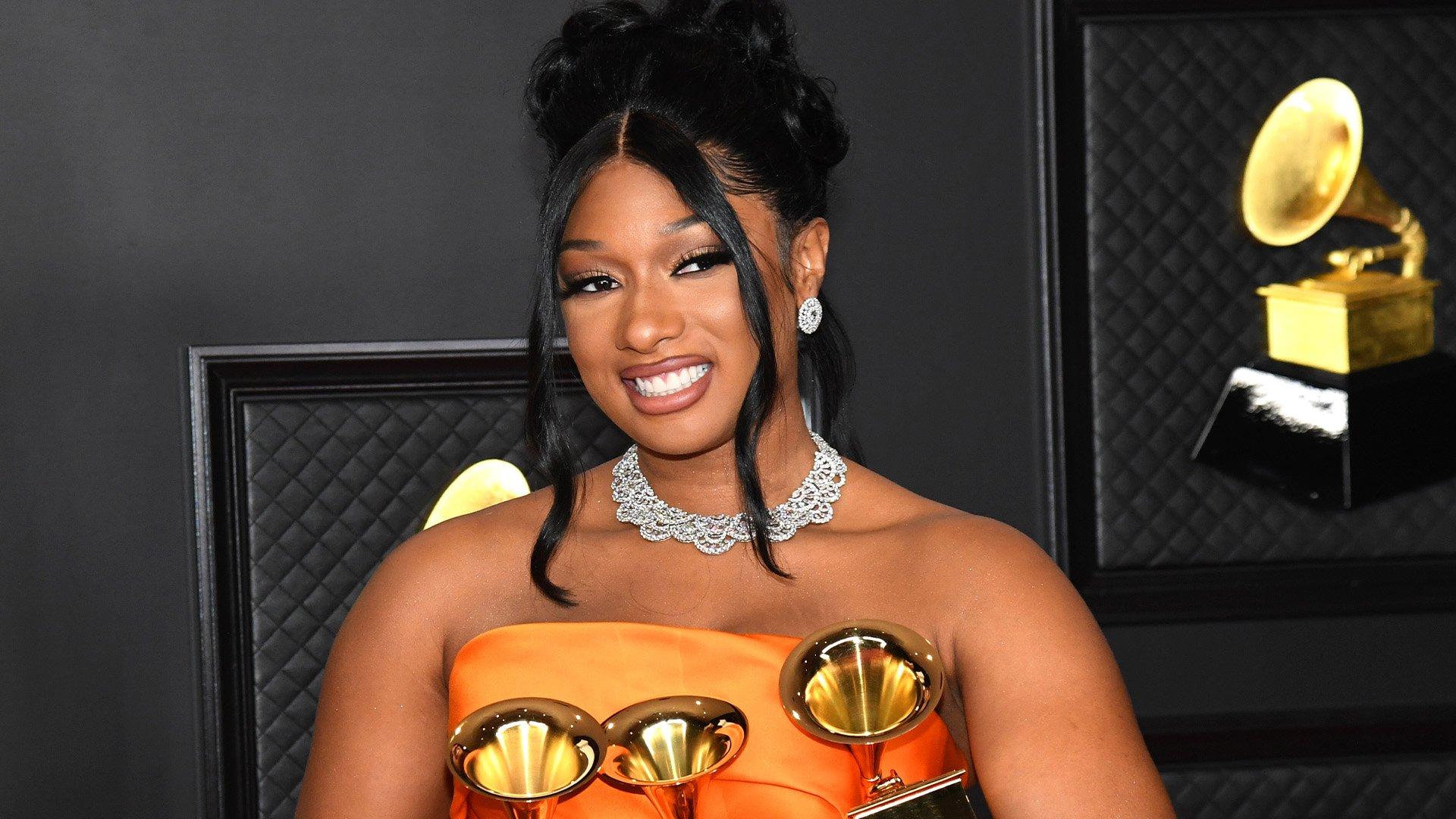
Photo: Kevin Mazur/Getty Images for The Recording Academy
video
GRAMMY Rewind: Megan Thee Stallion Went From "Savage" To Speechless After Winning Best New Artist In 2021
Relive the moment Megan Thee Stallion won the coveted Best New Artist honor at the 2021 GRAMMYs, where she took home three golden gramophones thanks in part to her chart-topping smash "Savage."
In 2020, Megan Thee Stallion solidified herself as one of rap's most promising new stars, thanks to her hit single "Savage." Not only was it her first No. 1 song on the Billboard Hot 100, but the "sassy, moody, nasty" single also helped Megan win three GRAMMYs in 2021.
In this episode of GRAMMY Rewind, revisit the sentimental moment the Houston "Hottie" accepted one of those golden gramophones, for Best New Artist.
"I don't want to cry," Megan Thee Stallion said after a speechless moment at the microphone. Before starting her praises, she gave a round of applause to her fellow nominees in the category, who she called "amazing."
Along with thanking God, she also acknowledged her manager, T. Farris, for "always being with me, being by my side"; her record label, 300 Entertainment, for "always believing in me, sticking by through my craziness"; and her mother, who "always believed I could do it."
Megan Thee Stallion's "Savage" remix with Beyoncé also helped her win Best Rap Song and Best Rap Performance that night — marking the first wins in the category by a female lead rapper.
Press play on the video above to watch Megan Thee Stallion's complete acceptance speech for Best New Artist at the 2021 GRAMMY Awards, and remember to check back to GRAMMY.com for more new episodes of GRAMMY Rewind.
Black Sounds Beautiful: How Megan Thee Stallion Turned Viral Fame Into A GRAMMY-Winning Rap Career
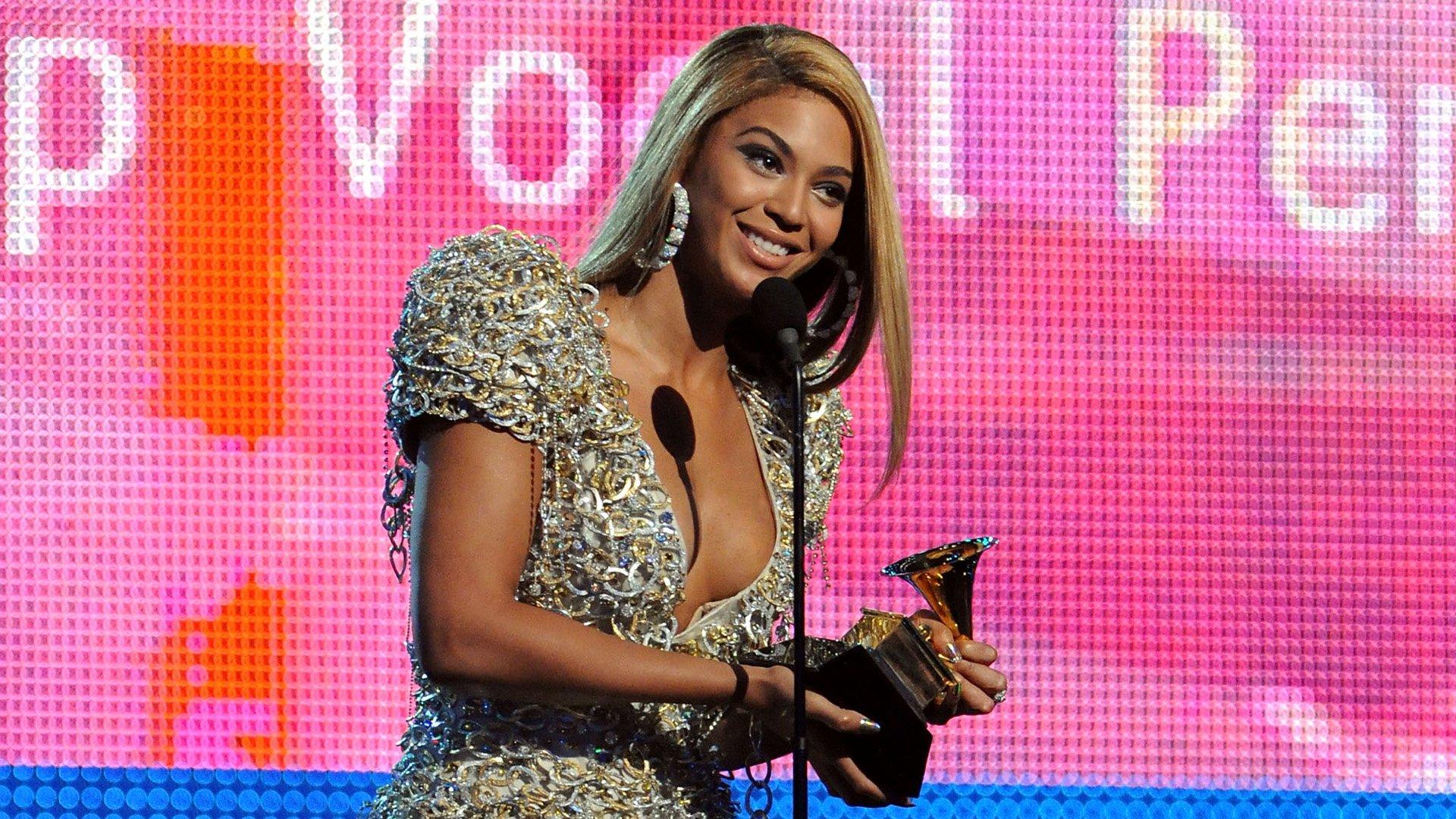
Photo: Jeff Kravitz/FilmMagic
video
GRAMMY Rewind: Watch Beyoncé Win A GRAMMY For "Halo" During Her Record-Setting Night In 2010
As you dive into Beyoncé's new album, 'COWBOY CARTER,' revisit the moment Queen Bey won a GRAMMY for "Halo," one of six golden gramophones she won in 2010.
Amongst Beyoncé's expansive catalog, "Halo" is easily one of her most iconic songs. Today, the 2009 single is her most-streamed song on Spotify; it was her first video to reach one billion views on YouTube; and it helped her set one of her GRAMMY records in 2010.
In this episode of GRAMMY Rewind, watch the superstar take the stage to accept Best Female Pop Vocal Performance for "Halo" in 2010 — the year she became the first female artist to win six GRAMMYs in one night.
"This has been such an amazing night for me, and I'd love to thank the GRAMMYs," she said, admitting she was nervous before taking a deep breath.
Before leaving the stage, Beyoncé took a second to thank two more special groups: "I'd love to thank my family for all of their support, including my husband. I love you. And I'd like to thank all of my fans for their support over the years."
The five other awards Beyoncé took home that night were for the coveted Song Of The Year ("Single Ladies (Put A Ring On It)") and four R&B Categories: Best Contemporary R&B Album (I Am... Sasha Fierce), Best R&B Song ("Single Ladies"), Best Female R&B Vocal Performance ("Single Ladies"), and Best Traditional R&B Vocal Performance (for her cover of Etta James' "At Last").
As of 2024, Beyoncé has won the most GRAMMY Awards in history with 32 wins.
Press play on the video above to relive Queen Bey's "Halo" win for Best Female Pop Vocal Performance, and check back to GRAMMY.com for more new episodes of GRAMMY Rewind.
Enter The World Of Beyoncé
Beyond Country: All The Genres Beyoncé Explores On 'Cowboy Carter'
Beyoncé Is The Genre-Bending Queen On 'Cowboy Carter': 5 Takeaways From Her New Album
Beyoncé's New Album 'Cowboy Carter' Is Here: Check Out The Featured Artists, Cover Songs, And Tracklist
Everything We Know About Beyoncé's New Album, 'Cowboy Carter': Two New Singles, Tracklist, A Shift To Country & More
How Beyoncé Is Honoring Black Music History With 'Cowboy Carter,' "Texas Hold Em," 'Renaissance' & More
Songbook: The Complete Guide To The Albums, Visuals & Performances That Made Beyoncé A Cultural Force
A Timeline Of Beyoncé's GRAMMY Moments, From Her First Win With Destiny's Child to Making History With 'Renaissance'
How Many GRAMMYs Has Beyoncé Won? 10 Questions About The 'Renaissance' Singer Answered

Watch Beyoncé Make GRAMMY History With Her 32nd Win In 2023 | GRAMMY Rewind
6 Takeaways From 'Renaissance: A Film By Beyoncé'
Beyoncé's 'Dangerously In Love' Turns 20: How The Solo Debut Foreshadowed The Singer's Icon Status
5 Takeaways From Beyoncé's New Album 'Renaissance'

How Beyoncé Has Empowered The Black Community Across Her Music And Art | Black Sounds Beautiful

The Creative Rebirth Of Beyoncé On '4' | For The Record
